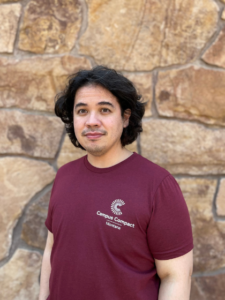The “Else” Word by David Mariani

Some questions in life are better left unasked. “Where are you from?” makes me bristle with its (hopefully) unintended micro-aggressive questioning of my origins and American-ness. “What do you do for work?” forces me to do a sidelong glance for insinuating my worth goes only as far as my useful to others. Word to the wise: Do not ask me when I plan on getting married and having kids. Recently, a new question made its way onto my list of questions that earn my ire, “What else are you doing?”
My site supervisor and I were recently discussing summer plans at my site project to make sure nothing falls through the cracks. A large whiteboard with due dates gets updated often with side projects and includes long-term goals because the team at the Great Falls College MSU Office of Student Engagement gets distracted with requests for assistance on a daily basis. Even though the board is always full, we still make time for others because we are cool. When my supervisor told me that he was asked what else I was working on, I found myself bewildered for a response.
At first, I tried to be positive about the situation and asked about the intonation the questioner presented. “What else are you doing?” and “What else are you doing?” differ from “What else are you doing?” was my argument. Moving the emphasis around sort of worked. Still, taking the bite out of the question seemed like hard work for such an innocent inquiry. Even though the team is confident with our direction and progress, the line of questioning had a sting to it that not even my search for good intentions could get past. Thankfully, I found the reasoning for my continued agitation: The question is terrible and should never be asked.
The problem lies in the “else” portion. Asking about other projects implies the questioner has no interest in the project that I am currently on and have kindly taken the time to explain to that person. No matter where the emphasis is placed when vocalizing the question, the words remain the same. Pivoting around it is nearly impossible. Looking for more, different, extra on top of what I am already doing suggests I am not doing enough. Dismissing what I have done and continue to do in order to get me to do something else insults me, my efforts, and my current project. Also, outside connotations around this particular four-letter word make it seem threatening, which should be an obviously undesirable circumstance.
More work always needs to be done. Bettering the world will never end. Take a minute to celebrate your successes—no matter what others’ opinions—because burnout is real. Enjoy your time with your team. Focus on what you are doing and make sure you give it the attention it deserves before looking for what else you can do. Do yourself and everyone else a favor by avoiding questions that discount sincere effort and genuine triumphs of all sizes.
Practice self-care because students need you for the long-haul. Avoid problematic probing of others. Demanding anything of anyone else betrays the generosity behind service, so make sure you learn how to politely turn someone away if you already have plenty. If you can, do. Feel free to ask for my help because I am always willing to take on more for those in need. That is a given. This is why I serve.
 Blog
Blog